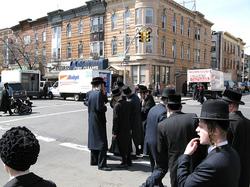As the Times Looks at Orthodox Sex Abuse, Critics Say It Should Credit Others' Reporting
By Nick Pinto
Last week the New York Times devoted successive front-page stories to the problem of sex abuse in Brooklyn's ultra-Orthodox and Hasidic communities and Brooklyn DA Charles Hynes's deference to the religious authorities that often try to cover the problem up. It's an important issue (one we touched on in our own cover story last fall), and one that deserves the spotlight that the New York Times can provide. Victims' advocates and journalists who have been tracking the issue for years were thrilled that the Times was finally turning its attention to a scandal that has long been been festering in its back yard. But many were dismayed that the Times series failed to credit the work of other reporters who have been on the beat for years. The Times had plenty of catching up to do. As one advocacy group's exhaustive catalog of press mentions makes clear, there's been a lot of reporting on the subject in the last decade. But some veterans of the Orthodox sex-abuse beat say the Times series relies so heavily on that reporting that it ought to acknowledge the debt. Among the examples they cite:
Perhaps even more importantly, the Times used its unmatched resources to do something no one else had yet done: crunch massive databases and sort through reams of court records to thoroughly debunk the District Attorney's office's lies about the success of its Kol Tzedek outreach program. The Times has an unambiguous ethics policy on attribution: "When we first use facts originally reported by another news organization, we attribute them." There are understandable reasons why that broad imperative might become more muddled in reporting on this topic. For one thing, there aren't that many sources to go around. The Haredi community is often suspicious of the press, especially when reporters want to talk about sex abuse. Inevitably, reporters writing on the subject find themselves talking to the same victims' advocates, who in turn refer them to the same handful of victims who are prepared to risk communal retaliation and tell their story to the press. Other resources, like court transcripts and filings, are matters of public record. Anyone can find them. But reporters in the Jewish media say the Times wouldn't have known to look for them without their work. Hella Winston, who reports on the subject for the Jewish Week, says the Times should acknowledge that debt. "There are certain clear instances where the Times violated its own code of ethics in failing to attribute facts first reported elsewhere," she says. "Beyond that, there's a journalistic ethical issue here, which involves acknowledging the vast body of work on which the Times's stories were clearly founded. If we -- The Jewish Week, The Forward, and blogs like UOJ and Failed Messiah, as well as New York Magazine -- hadn't done this reporting, there's likely no way the Times would have even known about these issues or known where to find those facts. They could have easily, elegantly acknowledged our contribution with a single sentence, and they didn't."Larry Cohler-Esses has also been investigating the Orthodox sex-abuse scandal for years, first at the Jewish Week and now at the Jewish Daily Forward, where he is assistant managing editor. He says he welcomes the spotlight the Times can bring to the issue, but he believes the Jewish media deserved acknowledgment for its work: "What the Times has done is enormously important. We could write about this until the cows come home, but the Times has done more in two days than we have been able to in many many years. Working from the foundation we've laid down, The Times has put the unique nature of the ultra-Orthodox community's grappling with child sexual abuse---and the Brooklyn D.A.'s relationship with that community---on the public's agenda for the first time. It has also advanced the story through its reporting on the role of Henna White, the D.A.'s community liaison to Brooklyn's ultra-Orthodox communities.Sharon Otterman, one of the reporters of the Times series, did not respond to a request for comment yesterday. The other reporter, Ray Rivera, declined to comment on the record. The Times's public editor, Arthur Brisbane, also declined a request for comment, telling the Voice that he's looking into the issue himself. Contact: npinto@villagevoice.com
|
.
Any original material on these pages is copyright © BishopAccountability.org 2004. Reproduce freely with attribution.
